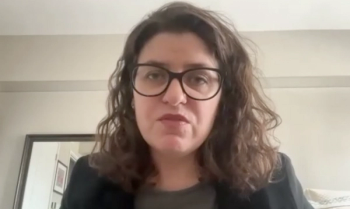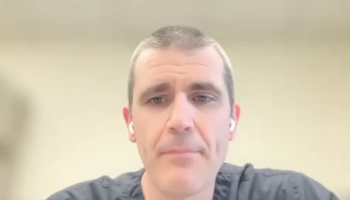
Katie S. Murray, DO, recaps several presentations on bladder cancer from the 2023 American Urological Association Annual Meeting in Chicago, Illinois.

Katie S. Murray, DO, recaps several presentations on bladder cancer from the 2023 American Urological Association Annual Meeting in Chicago, Illinois.

Kelly L. Stratton, MD, FACS, recaps several presentations on prostate cancer from the 2023 American Urological Association Annual Meeting in Chicago, Illinois.

The study also found a positive correlation between burnout and discrimination-based trauma in trainees.

Here’s how the specialty fared vs other eligible clinicians.

Implementing the right practice technology can not only mitigate physician burnout, it can also enable patients to take charge of their own care experience.

Jen-Jane Liu, MD, discusses how PSMA-PET imaging might help physicians decide whether or not a patient with prostate cancer needs lymph node dissection.

In the study, 69% of patients who underwent complete ablation had no visible disease at first endoscopic evaluation, compared with 40% of patients who underwent chemoablation therapy.

Of all malignant bladder cancer lesions, 28% were only identified with blue light.

Patients who underwent sacrocolpopexy and were discharged on post-op day 0 had fewer instances of readmissions and fewer high-grade (class III-IV) complications.

Researchers examined the impact of deep learning–based AI software upon radiologists reviewing multiparametric MRI scans in the assessment of clinically significant prostate cancer.

"This institute model will lower barriers for access to some of the highest quality care in the world,” says Alexander Kutikov, MD, FACS.

"The good news is that women have been entering medicine in increasing numbers for more than three decades. The not-so-good news is that women are still underrepresented and underutilized in positions of power," writes Deborah M. Shlian, MD, MBA.

“The medication is given once a week for 6 weeks. It is an outpatient procedure with general anesthesia. And it is typically covered by insurance,” said Joseph Brito, MD.

"What was great about this partnership is we recognized that this is going to be the future of medicine at some point, and we want to be able to be a part of that cutting edge technology," says Nitin K. Yerram, MD.

Adam B. Weiner, MD, and Ruchika Talwar, MD, discuss some of the notable urologic oncology abstracts that were presented at the 2023 AUA meeting.

Adding cabozantinib to nivolumab/ipilimumab improved PFS in frontline renal cell carcinoma; however, there was increased toxicity with the triplet, including more adverse event–related discontinuations.

Optimal bedtime was determined using the bedtime and mid-awake time for each patient, which was gathered from an Actiwatch Spectrum device.

The FDA has issued a complete response letter to ImmunityBio regarding its biologics license application for N-803 (Anktiva) for use in combination with BCG for the treatment of patients with non–muscle-invasive bladder cancer.

In this installment, Suzanne B. Merrill, MD, FACS, and Dan Humer, PA-C, highlight Colorado Urology, a Denver-based practice within the United Urology group.

"We anticipate that in the next decade, breakthroughs in genetic profiling of tumors for precision therapies will further reduce suffering and death from bladder cancer," writes Michael S. Cookson, MD, MMHC.

"In summary, it was safe and effective. There [were] no serious adverse events...and the vast majority of patients received no anesthesia with very similar results to shock wave lithotripsy,” said Ben H. Chew, MD, MSc, FRCSC.

"There is no simple or universal answer to the question of retirement savings. Many factors must be considered, but your financial adviser should be able to direct you so that you can enjoy a financially stable life once you stop working," writes Jeff Witz, CFP.

"It is unique given that in addition to providing prognostic information, it can serve as a marker to predict sensitivity to androgen deprivation therapy (ADT), which is the backbone of systemic therapy for men with prostate cancer," says Rana R. McKay, MD.

The tool uses clinical covariates to predict changes in storage, voiding, and nocturia LUTS for patients receiving placebo, dutasteride, tamsulosin, or DUT/TAM combination therapy.

The phase 3 RENOTORCH study is comparing the combination of the PD1-inhibitor toripalimab and axitinib with single-agent sunitinib in patients with renal cell carcinoma.

"Proxies for social determinants of health that we found to be associated with higher overall mortality included living in a more deprived area, as well as having Medicaid or Medicare insurance," says David Miller, MD.

Vivally System is a neuromodulation system that uses a closed-loop control algorithm and electromyography to personalize treatment for each patient.

In the ARASTEP trial, the primary outcome measure of rPFS is being measured by PSMA-PET/CT imaging with 68Ga-PSMA-11 (prepared using Illuccix) or piflufolastat F 18.

Here are some ways in which lawyers can remove potential jurors from a case.

"The study demonstrated that AS rate in the MUSIC cohort, which in 2014 had been lower than in the SEER cohort, increased rapidly, from approximately 20% in 2014 to nearly 50% in 2019, whereas the SEER cohort showed only a modest increase," writes Badar M. Mian, MD.